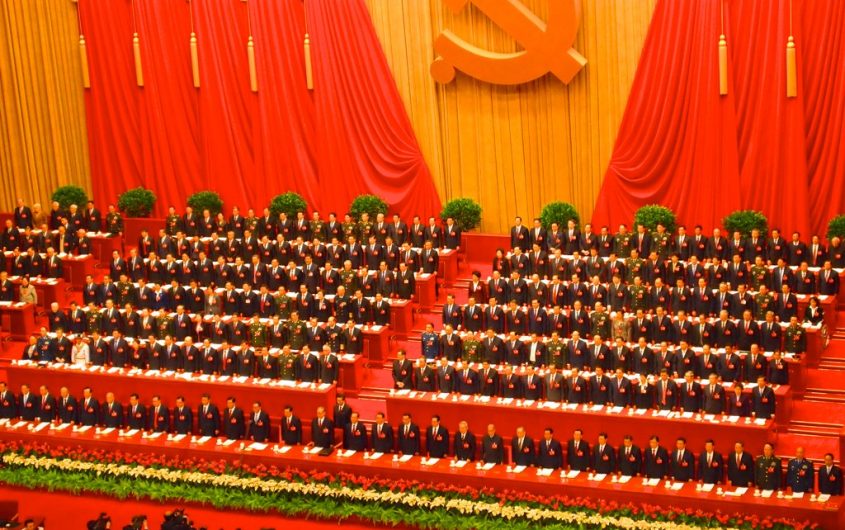
Remko Tanis via
Joern Quitzau is a Geoeconomics Non-Resident Senior Fellow at AGI. He is Chief Economist at Bergos, a private bank based in Switzerland. He specializes in economic trend research and economic policy. Joern Quitzau hosts two Economics podcasts. Prior to his position at Bergos, Joern Quitzau worked for Berenberg in Hamburg (2007-2024) and Deutsche Bank Research in Frankfurt (2000-2006) with a special focus on tax and fiscal policy. Dr. Quitzau (PhD, University of Hamburg) was a Visiting Fellow at AGI in April 2014 and September 2022 and an American-German Situation Room Fellow in April 2018. In recent years, China has developed into an important driver of the global economy with strong economic growth. As the second largest economy in the world, China is now responsible for around 15 percent of global economic output. But the success story also has its downsides. As an economic and political heavyweight, China is becoming a challenge in various respects, especially for Western industrial countries. In addition to economic concerns about China, political aspects are particularly important. It is now clear that the trade dispute between the U.S. and China is about more than just trade issues. It is obviously a question of the big picture and therefore of whether competition between China and the established industrial countries is governed by the same or at least rudimentarily similar rules. Western industrial countries tend to use the state for assistance only where the market is not able to adequately coordinate the interests of the private sector. The economic structure of a country is predominantly the result of free (international) competition. China, on the other hand, pursues concrete state goals and promotes certain key and future industries with state resources, sometimes to a considerable extent. Although China has now opened itself to market mechanisms, the economic structure is only in part the result of free market competition; political priorities play a large role. And these priorities envisage making China the innovation leader in key industries through targeted market intervention and protectionism, and the leading industrial nation in the long term. Subsidies, forced technology transfer, and the disregard of intellectual property rights are just as much a part of Chinese economic policy as the strategic purchase of companies abroad. Although China has now opened itself to market mechanisms, the economic structure is only in part the result of free market competition; political priorities play a large role. The Chinese model also differs from the established industrial nations in its strong (personal) interdependence of party, government, and business. Decision-makers largely come from the same political personnel pool. The influence of the Communist Party is extraordinarily high due to this network of personnel, even without explicit instructions and coercive measures. The economic peculiarities of the Chinese model go well beyond the differences that also exist between the established industrial countries. France, for example, is traditionally much more open to industrial policy than Germany. And the U.S. relies more on the power of the free market than the European economies. In the case of the established economies, however, it is a question of economic policy competition within a fundamentally market-based regulatory framework. China’s model, on the other hand, offers competition between different systems. Whether a laissez-faire approach of the West is the right reaction to China’s aggressive striving for power must be questioned critically. At the beginning of this year, the Federation of German Industries (BDI) issued a policy paper clearly stating its position and making 54 demands to the German government and the EU Commission in order to be better able to compete with China. Ultimately, the aim is to create a level playing field. Of particular interest is the political and social path taken by China. In the long term, the consequences could be even more serious than the economic challenges. Obviously there are very different views on the role of the state between liberal Western democracies on the one hand and China on the other. In liberal democracies, the individual takes center stage and the state only has a service function for those task areas in which private-sector solutions are not available. China’s path, on the other hand, is more reminiscent of the philosophy of the state, according to which the state is a natural organism and the individual is only a part of the whole. The state defines the overriding social goals to which citizens must subordinate their personal, individual desires and goals. With the pilot project of a social credit point system, with which the behavior of the population is to be steered and supervised, China garnered international attention. Good behavior—as defined by the state—is rewarded with bonus points, bad behavior with point deductions. The monitoring possibilities have now matured due to advanced digitalization, pronounced smartphone use, and facial recognition software. For the individual, however, this also means that it is extremely difficult to evade the surveillance mechanism. This would in fact require a far-reaching renunciation of modern lifestyles. Even Western societies do not refrain from steering the behavior of their citizens in socially or politically desired ways and sanctioning them. But this is done with the means of the rule of law. In Western societies, nudging is increasingly used. Nudging means measures that do not directly interfere with people’s freedom of choice. Nevertheless, the aim is to influence or correct “wrong” behavior based on a lack of information or distorted preferences. Instead of prescribing a certain behavior, the perspective or the environment for the decision-making situation is changed in advance in order to arrive at “better” decisions. Western states also try to persuade their citizens to behave better. However, there are opportunities for the citizens of a democracy to exert influence and punish unwanted plans and decisions of governments in the next election. Western states also try to persuade their citizens to behave better. However, there are opportunities for the citizens of a democracy to exert influence and punish unwanted plans and decisions of governments in the next election. This is a serious difference to China, whose president Xi Jinping has a lot of power. Moreover, his term of office has not been limited since a decision by the National People’s Congress last year. In a non-democratic system, a question that also arises in Western societies is much more pressing: Who is actually entitled to determine which behavior is “right” or “socially acceptable”? Authoritarian states lack essential correction mechanisms for arbitrary rules and regulations. China’s social credit point system must therefore be observed with some concern. The fact that this issue is relevant not only for China, but also for the rest of the world is due to the fact that there is fierce competition between China and the other nations in the field of artificial intelligence (AI) development. An important success factor is the availability of large amounts of data. Since China not only has a population of billions, but also apparently is not afraid to monitor the behavior of its citizens in order to obtain huge amounts of data in this way, China may secure a decisive competitive advantage in AI development. The political and social changes in China are therefore likely to have considerable economic consequences for the rest of the world. This is a short version of the German paper China: Herausforderung für Wirtschaft und Politik. China: A Challenge for the Western Economic and Political System

Jörn Quitzau
Bergos AG
Economic Policy: Competition between Systems
Politics: Democracy vs. Surveillance State









